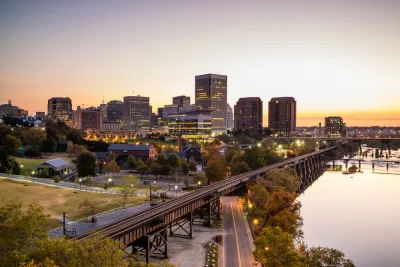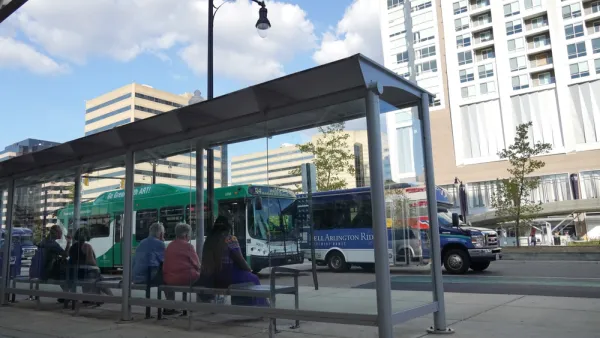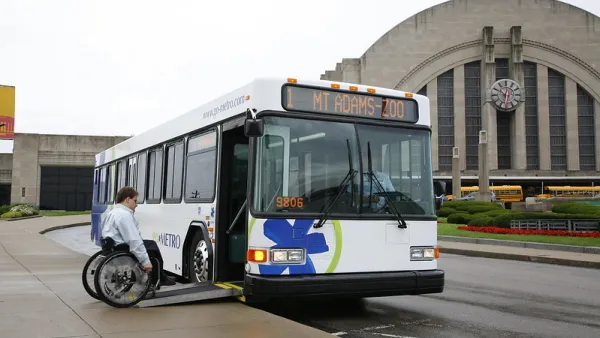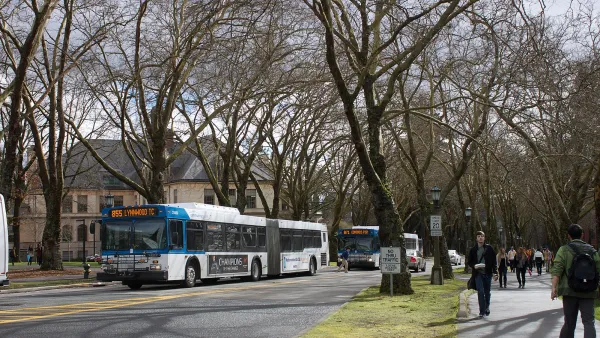With buses as a dominant transport mode for low-income households and "essential workers," free fares would increase access to economic opportunities and free up limited income for cash-strapped commuters.

In an op-ed, Wyatt Gordon and Faith Walker argue for the right to free transit, claiming that "to liberate ourselves from car-dependency, save the planet, and right the wrongs of the past, the bus should be free."
According to Gordon and Walker, "[t]he bus epitomizes a public good: it’s available to all, and society is better off the more people use it." Yet "[u]nlike other public services such as libraries and schools, we expect the bus to pay for itself, largely on the backs of the working poor who take it." In Richmond and other cities like it, the bus is run by a private company.
The bus isn't just useful to those who ride it, say the authors.
[W]hether you even know what GRTC [Greater Richmond Transit Company] stands for or not, you and your lifestyle are transit-reliant. The nurses in your hospital, the clerks at your local supermarket, and the custodians at your office or university represent just a fraction of the folks that rely upon the bus every day to get to work, to pick up their kids from school, and to shop or to seek out healthcare. Without access to fast, frequent, and reliable public transit, much of our economy and our society would come to a screeching halt.
Free transit can help people access jobs and opportunities, get kids to school, and provide crucial access to healthcare. Pointing to how eliminating bus fare can increase equity, the authors point out that "a full 89 percent of GRTC’s riders have household incomes below the state median," while more than half live below the federal poverty line. "If the bus were free like many other public services we all rely upon, Central Virginia’s poorest would get to keep that cash to pay for other essential expenses like housing, food, and healthcare. Going fare free functions as a backdoor boost to wages by allowing those who take transit to work to keep more of their money."
Gordon and Walker conclude that "[i]f our goal is to expand the freedom of our friends, family, coworkers, and neighbors, then eliminating bus fares is one of the most straightforward and equitable actions we can take."
FULL STORY: The Bus Should Be Free

National Parks Layoffs Will Cause Communities to Lose Billions
Thousands of essential park workers were laid off this week, just before the busy spring break season.

Retro-silient?: America’s First “Eco-burb,” The Woodlands Turns 50
A master-planned community north of Houston offers lessons on green infrastructure and resilient design, but falls short of its founder’s lofty affordability and walkability goals.

Delivering for America Plan Will Downgrade Mail Service in at Least 49.5 Percent of Zip Codes
Republican and Democrat lawmakers criticize the plan for its disproportionate negative impact on rural communities.

Test News Post 1
This is a summary

Test News Headline 46
Test for the image on the front page.

Balancing Bombs and Butterflies: How the National Guard Protects a Rare Species
The National Guard at Fort Indiantown Gap uses GIS technology and land management strategies to balance military training with conservation efforts, ensuring the survival of the rare eastern regal fritillary butterfly.
Urban Design for Planners 1: Software Tools
This six-course series explores essential urban design concepts using open source software and equips planners with the tools they need to participate fully in the urban design process.
Planning for Universal Design
Learn the tools for implementing Universal Design in planning regulations.
EMC Planning Group, Inc.
Planetizen
Planetizen
Mpact (formerly Rail~Volution)
Great Falls Development Authority, Inc.
HUDs Office of Policy Development and Research
NYU Wagner Graduate School of Public Service





























